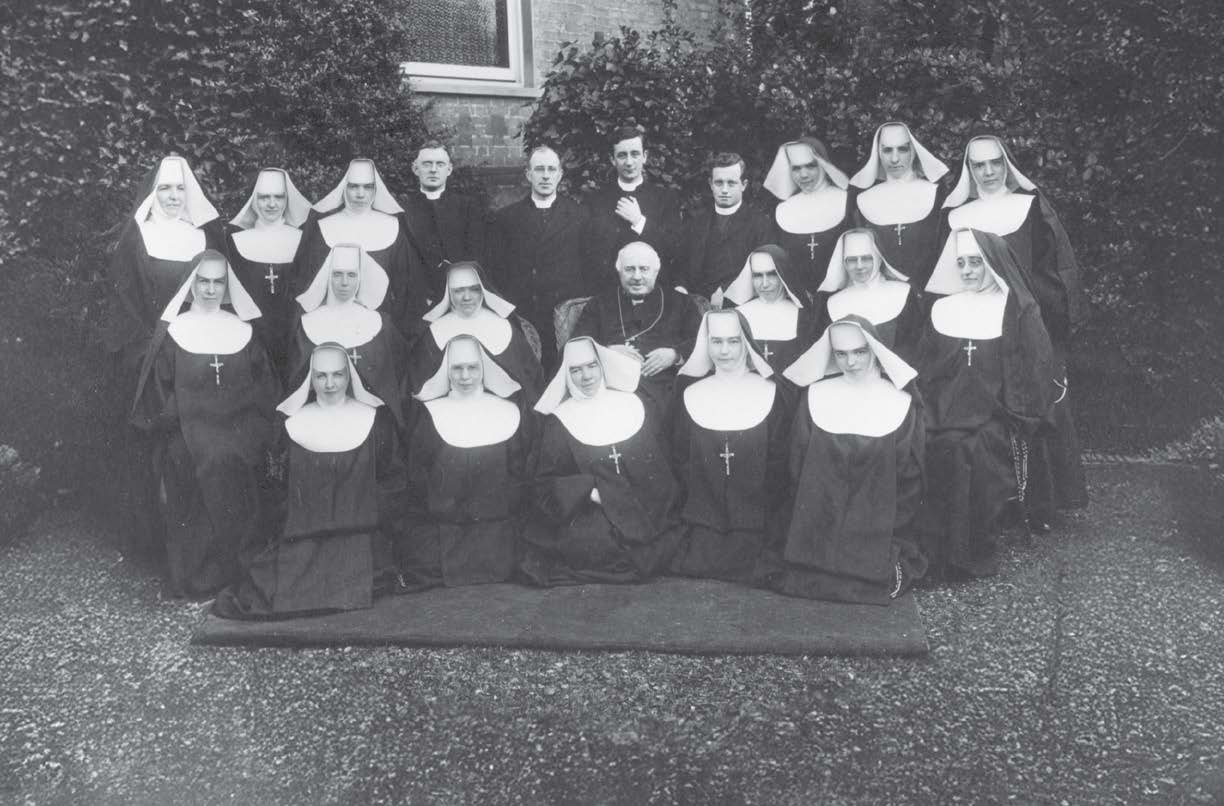History and Roots: Peace and Justice Amid Revolutionary Change
St. Mary’s Convent, Hanwell, 1913 – Mother Evangelista and Bishop Bagshawe in the center on the occasion of Sister St. John’s silver Jubilee.
By Susan Rose Francois, CSJP
When Bishop Edward Gilpin Bagshawe welcomed the Sisters of St. Joseph of Peace to the Diocese of Nottingham in 1884, he found in Mother Francis Clare and her companions courageous women who would promote peace through acts of mercy and justice to the poor. The next year, in fact, he published a compilation of pastoral letters on political economy titled just that, Mercy and Justice to the Poor.
“There can be no doubt,” Bishop Bagshawe wrote in this social teaching document, “that in many of the received usages of business and modes of making money prevalent in modern times, by which such enormous fortunes are accumulated in the hands of a few, while the multitudes are ever more and more impoverished, there is very much which is contrary to justice no less than to mercy.”
Bishop Bagshawe’s concerns about the negative impacts on the many of the accumulation of wealth by the few continued to be a major focus of his ministry and writing. In his 1888 pastoral letter for Advent, he wrote: “We Catholics in England find ourselves in this country in the presence of an enormous mass of poverty and pauperism, existing side by side with almost incredibly great wealth, possessed by those who are comparatively few in numbers. And the destitution of the poor is so extreme that it is true to say that millions among us live in abject misery and degradation, while millions more have the greatest difficulty in procuring the necessaries of life.”
He called on the people of his Diocese to see this disturbing reality through the eyes of faith, and to develop “a greater mutual charity among ourselves, and a greater love and reverence for Christ’s poor.” He offered a wide range of actions they might consider, from visiting the sick to registering voters.
No doubt, Bishop Bagshawe was delighted when Pope Leo XIII brought the light of the Gospel, and the weight of magisterial teaching, to these same economic forces and their harmful impacts. In May 1891, Pope Leo XIII wrote what is now considered the foundational document of modern Catholic Social Teaching, Rerum Novarum, which translates from the Latin to “of new things” or “of revolutionary change.”
“That the spirit of revolutionary change,” Pope Leo XIII wrote, “which has long been disturbing the nations of the world, should have passed beyond the sphere of politics and made its influence felt in the cognate sphere of practical economics is not surprising.” The Pope not only named the same dehumanizing conditions facing working people that Bagshawe highlighted, he also affirmed the rights of workers to just wages, rest, to form unions, and to strike if necessary. Decades before the Church articulated a preferential option for the poor, Pope Leo XIII recognized that while the wealthy “have many ways of shielding themselves … the mass of the poor have no resources of their own to fall back upon … And it is for this reason that wage-earners, since they mostly belong in the mass of the needy, should be specially cared for and protected by the government.”
Bishop Bagshawe devoted his 1891 Advent Pastoral Letter to what The Tablet called “the Papal Encyclical on Strikes” – Rerum Novarum. “A workman is God’s creature, made in the image and likeness of God. No one may lawfully refuse to respect his great dignity,” wrote the Bishop. “The wicked and oppressive practices which, since the Reformation, have pauperized and demoralized vast multitudes, both in Europe and America, have here, we trust, received a death blow … all struck at by the doctrine of the Pope.”
One cannot help but wonder what Bishop Bagshawe and Pope Leo XIII would make of the revolutionary changes currently taking place today, as we enter the second quarter of the 21st Century. The first actions of the new Pope, however, point to one possibility. By choosing the name Pope Leo XIV, the Holy Father made it clear that we are presently in the midst of another revolutionary era in desperate need of reflection and action in the light of the Gospel.
In his address to the College of Cardinals on his first full day in office, he noted that “Pope Leo XIII in his historic Encyclical Rerum Novarum addressed the social question in the context of the first great industrial revolution. In our own day, the Church offers to everyone the treasury of her social teaching in response to another industrial revolution and to developments in the field of artificial intelligence that pose new challenges for the defense of human dignity, justice, and labour.”
This article appeared in the Summer 2025 issue of Living Peace.

